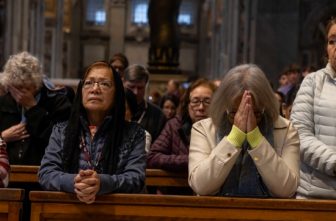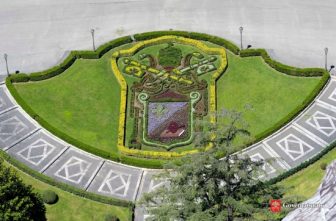
A prominent speaker in the Catholic Church today, Msgr. James Shea, poured his dynamism, love for Christ and hope for the Church into an address at the University of St. Thomas in St. Paul on March 28.
An ordained Catholic priest who is president of the University of Mary in Bismarck, North Dakota, Msgr. Shea touched on common themes in calling for a conversion of minds from a worldly way of seeing things to a Christian way of seeing the world in what is being called an apostolic age.
The oldest of eight children, Msgr. Shea grew up on a dairy farm near Hazelton, North Dakota. He earned a bachelor’s degree and a licentiate in philosophy at the Catholic University of America in Washington, D.C. and studied theology at the Gregorian and Lateran universities in Rome. As a deacon in Rome, his first cleric appointment was to the Bernardi Campus, which serves as a base for University of St. Thomas students studying abroad. On completing his seminary formation at the Pontifical North American College in Rome, Msgr. Shea was ordained a priest of the Diocese of Bismarck in 2002. He was appointed the sixth president of the University of Mary in 2009 and is a sought-after speaker.
“My sister and I saw his big speech onstage at the Eucharistic Congress (last July), and it just knocked our socks off,” said attendee Mona Wolney of St. John Neumann in Eagan.
The event, titled “The Church and Her Mission in These Days,” was cosponsored by the University of St. Thomas Catholic Studies Program, the Archdiocese of St. Paul and Minneapolis and the Roccasecca Project. Named for the hometown of St. Thomas Aquinas, the Roccasecca Project is a University of St. Thomas alumni effort that seeks to engage in campus life and celebrate, foster and cultivate Catholic identity and culture, in part, through such events.
Msgr. Shea began by discussing the origins of Christendom, the global Christian community. He recounted how it had taken hold of Greco-Roman civilization by the year 313 — not by any force of worldly conquest, but rather by the conquest of the Gospel through the perseverance and blood of the martyrs. Msgr. Shea contrasted the physical authority of Roman legions under Caesar with Luke’s infancy narrative of a helpless baby born into poverty and placed in a manger, signaling this was to be food and nourishment to others of God’s covert rescue mission. Shea used this contrast to talk about the “profound potency of the figure of the martyr” in Church history.
“Ever since the rise of Christianity, when the Christian vision of the world came to challenge and eventually overcome the Greco-Roman vision of the world,” Msgr. Shea said, “life in the West has become a series of what could be called Christendom cultures deeply informed in vision, in education, in law, in culture, and in habit of mind, by the Gospel of Jesus Christ.”
Msgr. Shea said a new set of circumstances in today’s world makes evangelization challenging, primarily because this is considered the first post-Christian age in history.
“The first evangelization was like winning the heart of a young maiden who had never fallen in love before,” said Msgr. Shea, quoting C.S. Lewis. “This new evangelization is like winning a cynical divorced person back to a previous bond.”
In a time that has been called “irreligious,” explained Msgr. Shea, religion is all around but it’s not entirely coherent and it has been called a moralistic therapeutic deism. It borrows much of its potency and impact from Christianity, he said, appropriating Christian principles to itself until it has become a religion that no one thinks is a religion.
Not only does the Church face a challenge in bringing faith to an unbelieving world, added Msgr. Shea, but it also battles darkness and corruption within itself. Similarly, each member of the Church must battle darkness and corruption within their own hearts.
So, what can be done? Msgr. Shea said not to wring hands and be gloomy. He said there is no story like the story of what God has done for the faithful in his “rescue mission.”
“It’s been called the greatest story ever told,” Msgr. Shea said. “It’s spectacular, a story that has built great cathedrals. And it’s not just a cultural achievement, but a story that saves us!”
He pointed to St. Paul’s advice in the sixth chapter of his letter to the Ephesians on how to fight. In just a few verses, the Apostle Paul exhorts followers to stand against the wiles of the devil, against the evil day, to stand fast in the truth, and to hold the faith up as a shield. This is the method by which the Church fights in the world, said Msgr. Shea. This is how Christ overcame the devil. In the same way, Christians in a fallen world are strongest when they refuse to give ground.
“And this is important,” emphasized Msgr. Shea, “because it shows our manner of combat is not according to worldly categories of success and failure. Often, our work will be crucified, our efforts will appear to have failed but that’s not a cause for discouragement, because the Lord is the Lord of resurrection.”
Jesus never whipped up anger or anxiety in his teachings, said Msgr. Shea, who reminded those present that they’re not fighting with worldly battlements. One act of sincere heartfelt charity, he offered, is worth more in advancing the cause of Christ than hours of listening to angry podcasts, days of sparring on social media, or years of paying attention to every discouraging news report. The enemy, he concluded, is dismayed by humility, devastated by charity, and terrified of the cross.
“In the end,” Msgr. Shea said, “the task that we’ve been given is to be the saints in the bloodstream of the Church, to be cheerful warriors.”
Nowhere in the New Testament, he pointed out, does it mention life with God as an achievement. Rather, it speaks of life with God as a perseverance, an endurance — but not without encouragement. Msgr. Shea reminded listeners that they were not responsible to do it all alone as orphan spirits.
“God’s responsible, too,” he said. “Remember, you didn’t ask to be born. You didn’t fill out some application to exist — he did that!”
Instead of becoming furious in the face of wickedness, sin, division or infidelity in the world or even within the Church, Msgr. Shea advised attendees to become more ardent and filled with an energy proportionate to their love. He concluded by reiterating that the best way to fight against darkness and corruption within the heart is to not give ground. In not giving up, he encouraged, the faithful always win.




